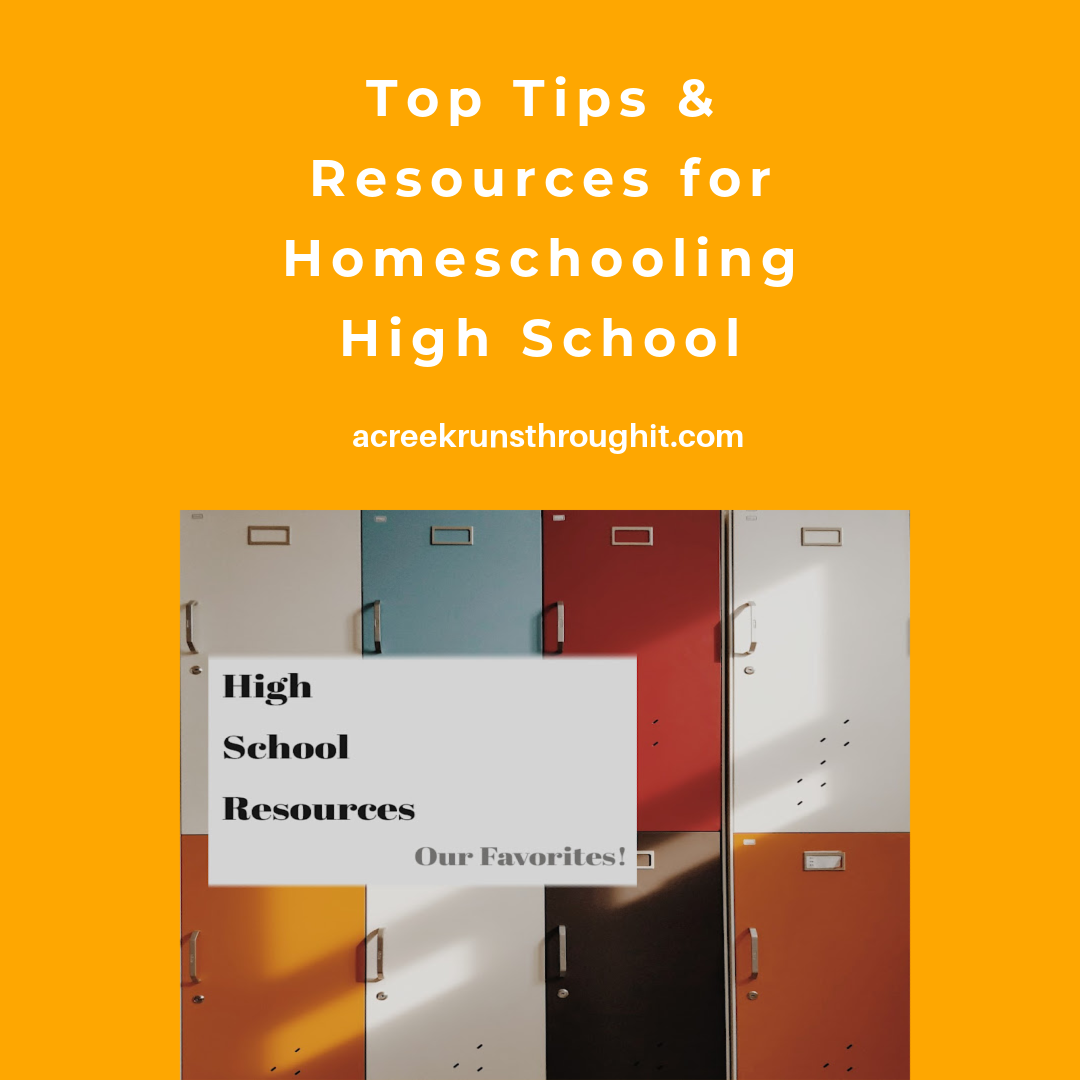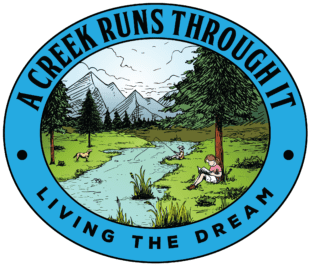I feel like homeschooling high school gets a bad reputation. High school is actually fun! It is when you get to see the fruits of all your labor. Your child is now very independent and the homeschool parent takes on the role of mentor, discussion partner, editor, and guide. You get to pick curriculum with your child, provide guidance as they go through it, and then talk about it- yay! The beginning years are spent teaching them to be independent and by junior year I felt like my main role was that of guidance counselor helping my daughter navigate the world of college options, testing, essays, summer opportunities, and transcripts.
**This post contains affiliate links, which means my family receives a small commission, at no extra cost to you, if you make a purchase using this link. Thank you!**
Here are some of our Favorite Tips & Must Haves for Homeschooling High School
1. Planner
High school kids are busy. Keeping track of assignments and activities requires a planner. This can be digital or paper. I am a paper gal and at this point so is my daughter. She really likes the Mardel A Simple Plan student planner. She is also considering the Full Focus planner for next year based on a recommendation from one of her online teachers.
2. Bibme or Purdue Owl
Using an online citation creator like Bibme or Purdue Owl seems like magic for those of us that had to tediously type up the correct formatting for our works cited page. Just remember this is simply a tool and is rarely 100% accurate! You must check all the info and often arrange it so that it matches the correct format.
And that is why you still need an MLA guide. We have and like this one:
3. Grammarly
Grammarly is a huge help for essay writing. Put it on your kids computer. You won’t regret it.
4. Prep Expert for SAT or ACT preparation
There are lots of ways to prep for college testing during high school. We decided to go with self-paced Prep Expert. It has been very helpful in teaching test taking skills. I cannot speak yet as to whether it improved test scores but my daughter certainly feels like she has learned specific skills that she can use for tests.
5. College on the Cheap Podcast
This podcast changed my outlook on how to homeschool high school and on getting an undergraduate degree. It discusses how to maximize college credit opportunities during high school to get an undergraduate degree as quickly and cheaply as possible, so that students don’t go into debt for their degree. It is eye-opening and has made me re-think how I will do things with our son. Listen to all the episodes- it is worth it!

6. Homeschooling for College Credit
This site is run by one of the women- Jennifer Cook De-Rosa- behind the College on the Cheap podcast. The information provided at Homeschooling for College Credit is immensely helpful. Get the book, join some of the FB groups (there are multiple groups depending on location and college interest), and take some of her classes. Not only will she help walk you through the homeschool transcript process, but she will help you learn how to maximize earning college credits in high school.
Her transcript intensive class gave me the tools to create a transcript and realize that it is not a difficult or scary thing to do! I also learned a lot in her CLEP for 11th and 12th grade course. Jennifer is a wonderful guide and excellent at sharing the knowledge she has. You can get her book here:
7. CLEP and Dual Enrollment
Arranging your homeschool so that your child can take a CLEP test after they finish a course will help them gain college credit for work they are already doing. For example, if you study American History in 9th grade then at the end of the year have your child take the History of the United States I and II CLEP tests. College is extremely expensive and getting as many credits completed can help cut those costs. If your student is taking an online class or has access to classes at a local college, consider dual enrollment but only if they are mature enough to complete the class and do well!
8. Camps & Volunteer opportunities
High school is a time for exploring life options. When else will your child have the time during the summer to go away to camp or volunteer? Once “life” and “work” start very few people make time for these things. Getting involved as a teen creates the habit of volunteering and allows them to have experiences they may not get later in life. Attending camps and volunteering also provide opportunities for your student to have other adult mentors.
9. Online Classes
We have utilized online classes through Lukeion Project, Clover Creek Physics, and Veritas Scholars Academy. Each class has given our daughter invaluable skills. She has done Latin through the Lukeion Project with Mrs. Barr. The classes are challenging but she adores Mrs. Barr, enjoys class, and has learned a ton. Mrs. Jetta Seboly with Clover Creek Physics was another amazing teacher that kept our daughter captivated and working hard (but not in an overwhelming way). Her Physics class fills up fast so make sure you are prepared to sign up when registration opens (typically around February). You can read a bit about our VSA Omnibus experience here. Our daughter loves the Veritas Press Omnibus classes and the live online courses through Veritas Scholars Academy have been a blessing.
By taking online classes in high school our daughter was exposed to schedules and grading from teachers other than mom. She gained skills in giving presentations, participating in class discussions, and studying for tests. I am so glad we utilized online classes during high school so that she was able to navigate the logistics of online learning while having support from her parents.
10. Cornell System Notebooks
Using notebooks based on the Cornell system of note taking has been a game changer for our daughter. The system really helps her to organize her notes. She likes the Oxford FocusNotes Notebooks but there are lots of options out there to choose from. These are the ones she likes:
11. A Timeline
If your student is college bound, it is helpful to have a general timeline for visiting schools, when to take college tests, college applications, and financial aid/scholarship deadlines. These sites offer great information with timelines- my future and 7sistershomeschool and Khan Academy.
A few tips I would add to the info from the above high school timeline sites:
Start visiting colleges early! Junior year is extremely busy and we found it stressful having to also add in school visits. I would spread this out more next time by incorporating college visits into our travels starting in 9th and 10th grade.
Make a list of what you and your student are looking for in a school, then create a spreadsheet-this can be on a computer or on a huge whiteboard like we did! For us it was important to look at more than just the tuition (although that of course is a HUGE part as the goal is to avoid debt). Here are a few extras to think about:
What is the local area like? What is the 4 year graduation rate- are kids getting out of the school in 4 years or is it taking 6 plus years to graduate? Cost of airfare to the school or can we drive? CLEP and dual enrollment acceptance policy? The amount of credits required to take at the school for graduation? The class size? What is the overall “feel” of the school? Is it Christian? Is it more conservative or liberal? Grad school acceptance rate? Research or work opportunities? What type of clubs/student groups do they have?
Each student’s list will look different, but that gives you an idea of some things to consider. It will also help to easily eliminate some college options.
And if you need to apply for testing accommodations:
If you need to apply for accommodations for the SAT, start the process early! The college board site says it takes 7 weeks for approval, but we found that it took over 10 weeks and a TON of phone calls to move the process along. We applied well before the required date listed on the site, had everything filled out completely with the correct documentation, and it still was not processed in a timely manner.
We also applied for accommodations for the CLT (Classic Learning Test) which is becoming more popular with homeschoolers and they were approved within 2 days!! Wow what a difference! The staff at CLT have been extremely responsive and helpful- a stark contrast to our experience with the SAT.
Homeschooling High School can be a JOY! Hope these tips help!
Overall, I realize that the high school years can feel scary and overwhelming for many homeschool parents. We often feel a heavy burden of responsibility for the future of our children and don’t want to mess anything up. I would encourage you to stay calm, focus on having a plan for the high school years, and utilize all the resources out there to help make the journey easier. After that, sit back and enjoy the time with your teen!

